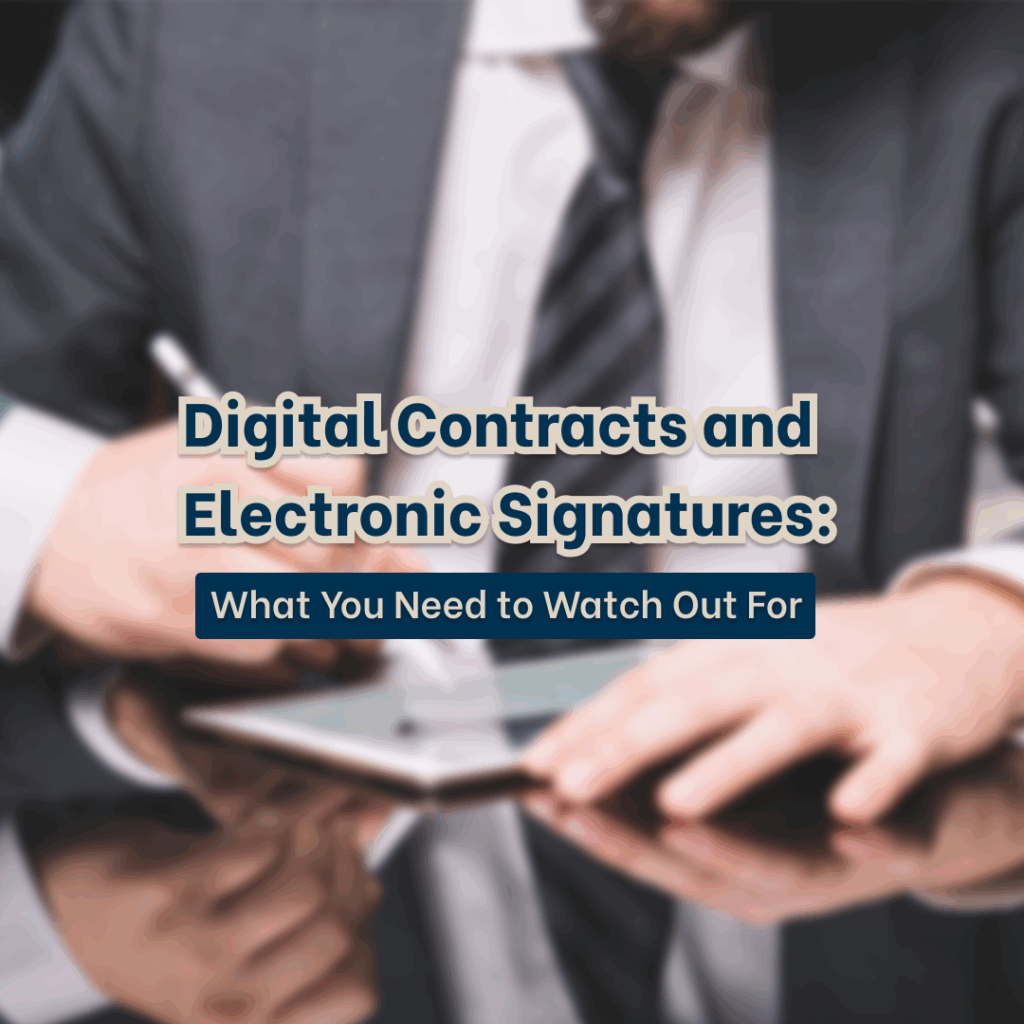In today’s fast-paced digital transformation era, contracts no longer require printing, physical signatures, or courier delivery. With just a click or a digital signature, an agreement can now be legally binding. However, despite their convenience, digital contracts and electronic signatures carry legal risks that many users often overlook.

So, what should you be aware of when using digital contracts and electronic signatures? How can these contracts be valid under Indonesian law, and how do digital signatures differ from traditional ones? This article explores the critical legal aspects of digital contracts and how to use them safely and effectively.
What Are Digital Contracts and Electronic Signatures?
Individuals or businesses create, store, and execute a digital contract electronically—without using paper.
An electronic signature enables users to give their consent or approval on an electronic document through digital means.
Indonesia’s Law No. 11 of 2008 on Electronic Information and Transactions (ITE Law), amended by Law No. 19 of 2016, recognizes and enforces electronic signatures, as long as they meet certain legal requirements.
Two Types of Electronic Signatures: Certified vs. Uncertified
There are two types of electronic signatures under Indonesian regulations:
1. Certified Electronic Signature
An official electronic certification provider registered with the Ministry of Communication and Information (Kominfo), such as Peruri, PrivyID, and others, authenticates this e-signature. This type of signature offers stronger legal validity due to:
- Verified user identity,
- Encrypted data that’s resistant to tampering,
- An audit trail and activity logs for verification.
2. Uncertified Electronic Signature
This includes scanned signatures, image files, or simple click-to-agree buttons (e.g., “I Agree”). While people find these signatures more practical, weaker authentication mechanisms make them vulnerable to legal challenges in court during disputes.
The legal strength of an electronic signature largely depends on its context, the security system, and whether the signer can prove they made the signature.
What Legal Risks Should You Be Aware Of?
Although Indonesian law recognizes digital contracts, users should carefully consider several legal issues:
a. Party Authentication
Ensure that the individual signing the contract is legally authorized. Poor authentication opens the door to disputes and fraud.
b. Document Integrity
Digital files can be easily modified. Therefore, document security measures such as hash functions, timestamps, and audit logs are essential to maintain integrity.
c. Evidence in Court
If the digital contract is ever challenged, you must be able to prove that:
- The signing process was legitimate,
- The signer’s identity was valid,
- The document remained unchanged after signing.
d. Informed Consent
In platform-based agreements, a simple “click to agree” may raise questions if the user didn’t read the terms. This can be disputed in court if the contract is deemed unfair or unconscionable.
Best Practices to Ensure Legal Validity of Digital Contracts
To ensure your digital contract is legally valid and enforceable, follow these recommended practices:
- Use a certified electronic signature provider.
- Make sure the system includes tamper-proof audit trails and logs.
- Include explicit consent clauses within the contract.
- Document the entire signing process, including timestamps and user identity verification.
- Store contract copies in encrypted, immutable formats.
In The Law of Electronic Commerce by Jane K. Winn & Benjamin Wright (2019), the authors emphasize that technology alone cannot replace sound legal procedures. They explain that digital tools are just tools, and users must apply proper protocols to keep them valid and secure.
Case Study: When a Digital Signature Was Disputed
In 2022, a business partner filed a lawsuit, claiming that a colleague had forged his digital signature.
The court ruled the contract invalid because the colleague had signed it using an ordinary email account without completing any authentication or verification process.
Conversely, in another case, the court upheld a contract as legally binding after the parties signed it using a certified digital signature service. The system’s audit trail and biometric verification helped prove the contract’s authenticity and the signer’s consent.
Conclusion: Advanced Technology Requires Strong Legal Discipline
Digital contracts and electronic signatures have revolutionized the way we handle agreements.
However, behind the ease and speed lies a layer of legal complexity that must be carefully understood.
Whether you are a business owner, professional, or individual user, it is important to remember that the validity of an electronic signature is not just about the technology. Rather, it also depends on the procedures, authentication, and supporting evidence. Therefore, by implementing best practices and using legally certified systems, your digital contracts can be legally binding, secure, and fully recognized by Indonesian law.
